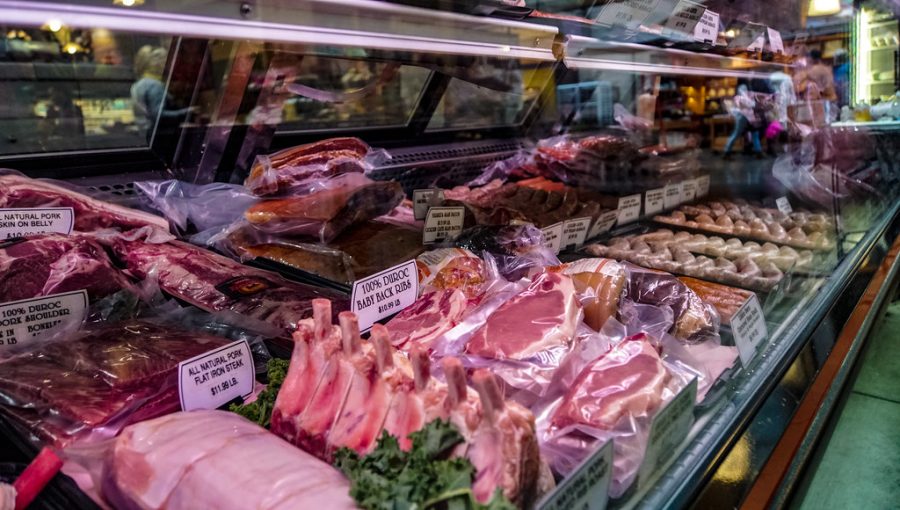Is the Meat Industry at Steak?
Meat selection at Meat Cones, San Francisco CA. Courtesy of Ted Eytan
California is commonly stereotyped as a healthy eating, vegan loving, fitness crazy state. It is true California is well known for its food from the famous In-N-Out burger to the vegan smoothie bowls and salads. A vegan lifestyle is widely popular in the golden state, roughly 39% of California’s population are vegan or vegetarian, especially after animal rights activists pushed strongly for Proposition 12. Prop 12, also known as the Farm Animal Confinement Initiative, set a new standard for the living conditions of farm animals raised for meat and banned all animal products that failed to meet these demands. A Supreme Court case regarding the proposition was recently reopened as many farmers, especially small hog farmers, couldn’t afford to meet the new requirements. Animal rights advocates continue to push for meat alternatives and better lives for the animals destined to be slaughtered, but California has no clear solution.
On one hand, animal rights activists favor a better Californian farming system and uphold a good reputation for the state. Limits on meat production open up a window for vegan and vegetarian alternatives, both widely popular in California, to thrive. These alternatives are not only eco-friendly but are also cheaper than most butcher meats. One of the most famous meat alternative brands, Impossible, has flourished in recent years. On the Impossible website, the company strongly encourages consumers to join them in a stand for change. Vegetarian meat alternatives can reduce the carbon footprint as they require less land, water, and produce 91% less GHG emissions (when compared to standard beef production). These alternatives are also deemed healthier than the average diet in some aspects, including higher vitamin intake and lower levels of cholesterol.
The farmers of California oppose this proposition because the increased regulations could send them out of business and limit the overall production of meat throughout the state. “Proposition 12 regulations will increase the cost of raising pigs and ultimately, the cost of pork for consumers,” said Lori Stevermer, Vice President of the National Pork Producers Council, or NPPC, during the council’s media roundtable. The state of the matter is there is currently more consumption value and demand for meat products. Petitioners of the NPPC and the Animal Farm Bureau Federation stood to represent their side on this issue to the Supreme Court on October 11, 2022, stating that Prop 12 wasn’t helping animals as much as advertised and hurting farmers far more than predicted. After hearing the argument, Justice Elena Kagan concluded, “We live in a divided country and the balkanization that the farmers were concerned about is surely present today.” The divide she refers to expresses the two arguments of the case; that the Proposition is only hurting California and that the Proposition is a step in the right direction for a fight against Climate Change and Animal Rights. Justice Ketanji Brown Jackson brought up a point saying “If you have a health and safety problem, then the state says ‘We can’t let people have access to these goods because it’s going to hurt them.’ But I think you have a different set of issues when you’re talking about a moral objection,”. Jackson also raises a suggestion to label products of different productions and let the Californian Residents decide their moral position to buy meat produced in different ways.
In October 2022, the Supreme Court case heard another argument, this time for Prop 12 stating that it needed to grant more freedoms to animals in confinement. The PETA, the People for Ethical Treatment of Animals, published a statement by Sara Oliver on October 11, 2022 stating “Prop 12 will mislead consumers into thinking that buying pig flesh or stealing chickens’ eggs is somehow ‘humane’. The only way to stop the suffering of animals used for food is to not eat them.” While this is an obvious solution it won’t persuade many Americans, especially Californians, who consume pork and chicken on a daily basis. Ingrid Newkirk, PETA President, followed by other animal rights activists organized a peaceful protest outside the Supreme Court Building to push for further regulations on meat production.
The case is still on stand as of October 24, 2022 and proves the divide in the Californian meat industry. The reality is, many farmers cannot afford a better living situation for the animals set to be slaughtered. In the eyes of many activists this can be a good thing as less meat farmers mean less meat production. With vegan and vegetarian alternatives only increasing in popularity, Proposition 12 is likely to set more regulations on the production of meat in the Golden State.






